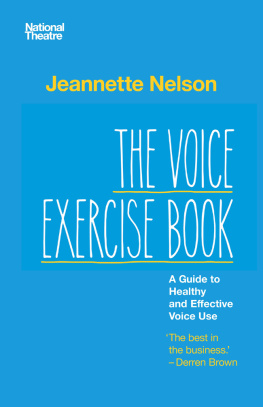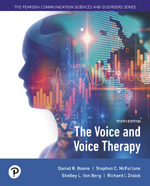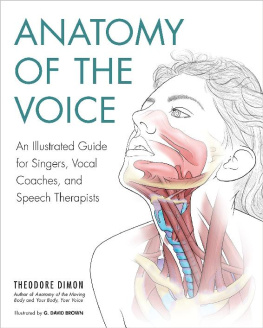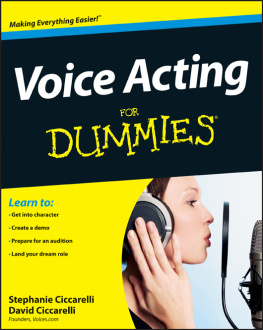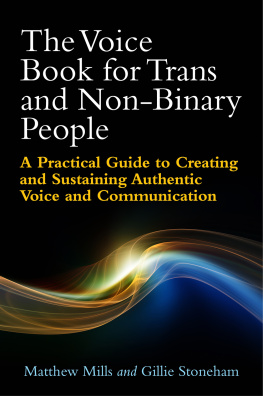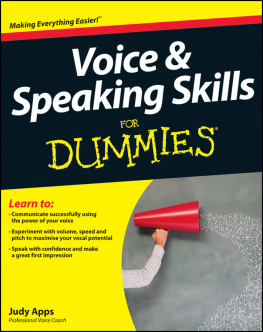My purpose in writing this book is to give voice to my work, knowledge, experience, and passion for the benefit of professional and amateur voice users who are suffering with vocal problems or wish to prevent them. This group includes singers, actors, teachers, professors, broadcasters, lawyers, executives, auctioneers anyone who uses their voice in any manner for the communication of art, information, or ideas. I have written it as well for those who work with voice users, including voice teachers, voice coaches, and speech-language pathologists.
I used the word passion above because it describes my own involvement in this work. Indeed, I feel blessed to have helped voice users of all types, including actors and singers, for more than three decades. I am still surprised and am always thankful that my journey has led me to such an exciting and fulfilling career. I hope readers will indulge me a brief description of that journey, though it does bear directly on the content of this book.
It began when I was in grade five. Singing in the Glee Club was the major social event for boys and girls in my school in Toronto. As far as I was concerned, failing to get into this choir would make me a social outcast. Twenty-nine of us arrived for the audition: fifteen boys and fourteen girls. The music teacher, aware of the effect that rejection would have on us, let all of us join. However, he quickly figured out that I and four other boys could not sing. What to do?
In the case of one song, My Grandfathers Clock, he found a way to save our face and the audiences ears. Our role was not to sing but to cluck with our tongues against our cheeks, mimicking the sound of a clock ticking. That was it.
This music teacher is a friend and a patient of mine all these many years later, and we often laugh about my auspicious, if not suspicious, beginnings. He is fond of saying, Brian, I knew you would be successful in your career, but I never thought it would have anything to do with singing.
I received my medical degree and my specialization in otolaryngology (the ear, nose, and throat specialty) from the University of Toronto. As part of my residency, I took a year of surgical training in San Francisco. I was in a study club during that time, which met in the home of one of my professors, the Chief of Otolaryngology at the University of California, San Francisco. We discussed the physiology of the voice and also took some field trips to the San Francisco Opera.
I loved music but had not been exposed to opera except through listening to LP recordings.
My first opera concert was scintillating, thrilling, and awe-inspiring. Live theater plus music plus great stories sung in a way that felt so personal, moving, and intimate it was like a movie spectacular, only bigger, better, grander, and more real. I was hooked.
I became fascinated by the voice, this musical instrument that can produce pure sound without the modification of tubes, chambers, valves, or stops the purest sound a human can make.
I completed my residency in otolaryngology after my fellowship examinations in ear, nose, and throat. I then joined the Central Hospital, Toronto, which had been founded by two Hungarian doctors John and Paul Rekai after they fled their country following the Hungarian Revolution in 1956. One brother was a specialist in internal medicine; the other was a general surgeon.
It so happened that the internist Dr. Paul, as he was affectionately called was a passionate and knowledgeable lover of opera. He sat on the board of the Canadian Opera Company. Not long after I took up my clinical responsibilities at the hospital, he called me in to his office.
You will be the doctor for the opera company, he announced in his thick accent.
I was flattered, intrigued, and concerned. I felt I was well trained and capable; however, I was keenly aware that I had not been prepared to care for the professional voice. On a scale of 1 to 10, my residency training in vocal problems was 0.1. I knew what vocal cords should look like but knew nothing of voice-production pedagogy and precious little about opera and its demands on the voice. My musical training was limited to a year or two of piano back in the mists of time.
I could easily make clinical diagnoses regarding the status of patients in my office or even in the operating room. But determining the status of a professional voice, deciding how to treat it, and knowing whether or not it was safe for a singer to sing that night? All this was too lofty for me. I knew that vocal careers are made or lost by decisions such as these.
However, despite my qualms, I decided to proceed in this new direction. I enrolled in extra training courses, consisting primarily of seminars in the United States. I served on panel discussions at international symposia. I studied in New York City with one of the great voice specialists of all time, Dr. Wilbur Gould. Once a month, for four months, I flew to the Big Apple on a Thursday and spent part of that day and all of Friday in his office. (Fridays began with breakfast at 7 a.m. at the Carlyle Hotel at 76th Street and Madison Avenue.) Dr. Gould was the voice doctor for Broadway productions and the Metropolitan Opera. As I grew comfortable with him, I grew comfortable with myself and my own abilities. I also spent time in Philadelphia with Dr. Robert T. Sataloff, a professor of otolaryngology and voice specialist at Thomas Jefferson University.
As theater burgeoned in Toronto during the late 1970s and 1980s, courtesy of productions by Livent and Mirvish, more and more Broadway-bound shows previewed in the city, with the great performers being cast in the major roles. Cats got it started, and then along came Phantom of the Opera, Show Boat, Ragtime, Chorus Line




